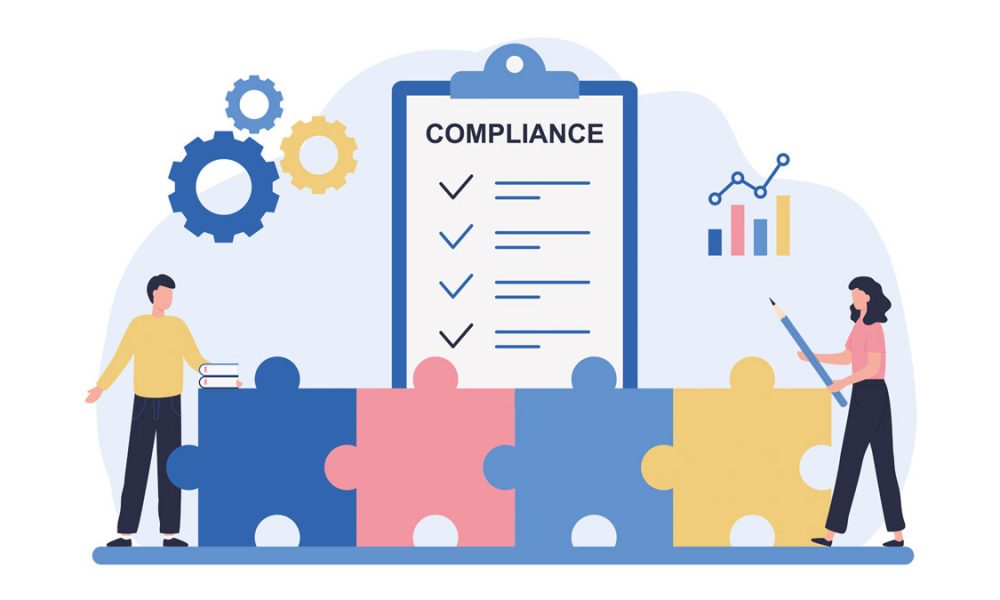As a business professional, you need to understand the concept of compliância and why it matters. Compliância refers to the policies, procedures, and controls implemented by an organization to ensure that it complies with laws, regulations, and ethical standards. For any company, compliância is critical to avoiding legal issues, financial penalties, and damage to reputation.
This article provides an overview of the key things you need to know about compliância, including the types of compliância programs, how to develop and implement an effective program, and best practices for monitoring and auditing compliância within your organization. With the right approach, you can establish a strong compliância framework to guide your company and employees.
What Is Compliância?
Compliância refers to the conformity and adherence to rules, policies, standards, or laws. In short, it is the act of complying with a set of guidelines.
For organizations, compliância means establishing and following procedures and controls to ensure the integrity of business operations and compliance with industry regulations and legislation. This includes areas such as:
- Governance – The organizational structure, reporting lines, decision rights and accountabilities. Policies and procedures to guide behavior and business activities.
- Risk management – The processes for identifying, assessing and mitigating risks that could impact the achievement of objectives. Managing risks within the organization’s risk appetite.
- Regulatory compliance – Adhering to relevant industry laws, regulations and standards. Ensuring activities and controls are in accordance with regulatory requirements.
- Ethics and integrity – Promoting a culture of integrity, ethical values and behavior. Preventing and detecting inappropriate conduct and illegal activities.
- Information management – policies and processes for managing data and information as business assets. Protecting sensitive and confidential information.
For individuals, compliância is understanding and following the rules that govern behavior and activities. This includes adhering to an organization’s code of conduct and compliance policies, as well as relevant laws and regulations. Non-compliance can lead to disciplinary action and legal penalties.
In summary, compliância is crucial for well-governed organizations and ethical conduct. It provides the foundation for operational excellence, risk mitigation and maintaining the trust of stakeholders. Compliance should not be viewed as a burden, but rather an enabler for responsible and sustainable business practices.
Why Is Compliância Important for Businesses?
Compliance refers to conforming with laws, regulations, standards, and ethical practices. For businesses, compliance is critical to avoid legal issues, protect customers, and maintain integrity.
Why Is Compliância Important for Businesses?
There are several reasons why businesses should prioritize compliance:
- Avoiding legal penalties and lawsuits. Non-compliance with laws and regulations can result in hefty fines, legal sanctions, or even criminal charges against a company and its executives. Lawsuits can also damage a company’s finances and reputation.
- Protecting customers and employees. Adhering to safety, health, and ethical standards helps ensure that products, services, and workplace conditions do not harm customers or employees. Failure to do so can jeopardize lives and livelihoods.
- Maintaining reputation and trustworthiness. Compliant companies are viewed as responsible, principled, and trustworthy. Non-compliance, on the other hand, can severely damage a company’s reputation, brand image, and customer relationships.
- Improving processes and efficiency. The steps required to achieve compliance, such as audits, documentation, and corrective actions, can reveal opportunities to streamline and improve business processes. Compliance also promotes a culture where employees understand the importance of rules and procedures.
In summary, compliance should be an integral part of any business strategy. While it requires an investment of time and resources, compliance pays off through avoiding risks, protecting stakeholders, building reputation, and enhancing operations. For these reasons, compliance merits the ongoing commitment of companies and executives.
How to Achieve Compliância: Tips and Best Practices
How to Achieve Compliância: Tips and Best Practices
To achieve compliância, there are several recommended steps you can take:
Focus on transparency and accountability. Be open about your processes and decision making. Maintain proper records and documentation to demonstrate compliance. Conduct regular audits and reviews of compliance controls.
Prioritize compliance education and training. Educate all staff and personnel on compliance standards, policies, and procedures. Provide tailored compliance training for those in higher-risk roles. Stay up-to-date with the latest regulations and best practices.
Implement strong compliance controls. Have clear policies, procedures, and controls in place to guide compliant behavior and prevent violations. Monitor compliance metrics and key risk indicators. Perform periodic compliance risk assessments.
Promote a culture of ethics and integrity. Foster an organizational culture where compliance is valued. Set a proper tone at the top. Offer incentives and recognition for compliant and ethical behavior.
Address compliance issues immediately. Have a process in place to promptly detect, investigate, and remediate any compliance violations or gaps. Take appropriate corrective actions to minimize risks. Self-report any material compliance failures to the relevant authorities.
Staying on top of the regulatory landscape and maintaining a robust compliance program are the keys to achieving compliância in your organization. With diligence and commitment, you can meet your compliance obligations and build a reputation for integrity. Continuous improvement and keeping an open and accountable environment will serve you well.
Conclusion
As you have read, compliância is an important concept in business and life in general. Following the rules and meeting your obligations are key to maintaining order, trust, and fairness. While it may sometimes feel restricting or inconvenient, compliância helps create a functioning society and productive relationships. Understanding your responsibilities and dedicating yourself to ethical behavior and integrity will serve you well in your personal and professional endeavors. Make compliância a habit through diligence and consistency, and you will build a reputation of dependability that leads to greater opportunities and success. Meet your compliância requirements fully and willingly, and you will rest easy knowing you are contributing to the greater good.
 Lifeyet News Lifeyet News
Lifeyet News Lifeyet News





